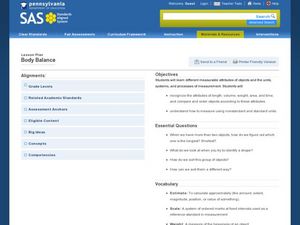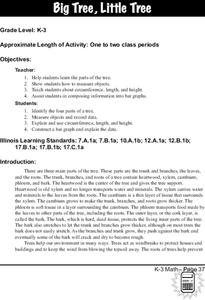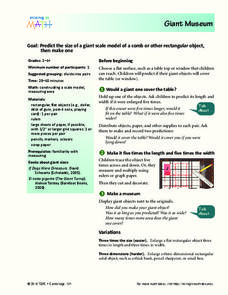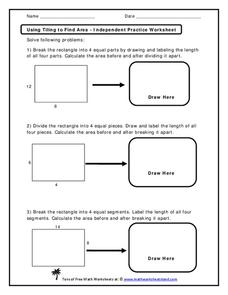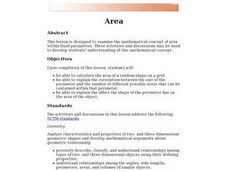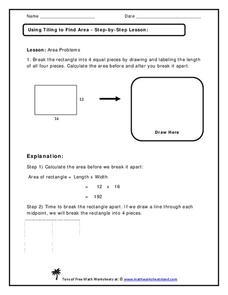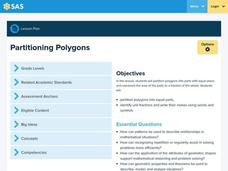Curated OER
British Units of Measurement: Pounds, Pence, Meters, Centimeters
For this British units of measurement worksheet, students answer 8 questions in which they either estimate and then add pounds and pence, or they measure a length using meters and centimeters. Students can determine whether their...
Curated OER
Cooking with Math
Fourth graders practice multiplication and division with cooking recipes. In this math lesson, 4th graders look at a recipe and change it so that it works for twice as many people or half as many people.
Curated OER
How to Read a Ruler
A n incredibly thorough worksheet on how to read and use a ruler awaits yours students. Students identify lines on the ruler and use the proper abbreviations for the lengths. Students answer ten questions about ruler usage.
Curated OER
Linear, Square, and Cubic Units
Linear, square, and cubic units are all investigated as different types of packages are measured. The teacher will need supplies such as a box of aluminum foil, a package of ribbon, and a bag of mulch. The class determines the...
Curated OER
Can You Build It?
Pupils investigate the concept of perimeter. They design there own figure and measure the perimeter of it. The lesson is given the context of the shape being a path that is traveled by a ladybug. This provides the shape of the plane figure.
Curated OER
Body Balance
Examine measurable characteristics of objects to build an understanding of the different ways you can discuss an object's size when comparing it to other objects. After whole group instruction, the class compares and organizes several...
Curated OER
Trees
Learners investigate the parts of a tree, measure its circumference and the length and width of its longest branch. The data is compiled and placed into a bar graph.
Curated OER
Giant Museum
Scholars make a giant scale model of an object. They will take a regular item and enlarge it to five times its length and width. They attempt this same concepts with a 3D model.
Curated OER
Measurement
Pupils create two prisms out of the same paper. They calcuate the number of centimeter cubes needed to fill each prism. They discover the concept of volume.
Curated OER
A Special Relationship
Learners discover the relationships of the lengths of the sides of right triangles and right triangles using a series of drawings on dot paper. They investigate and solve problems of standard (customary and metric units) and non-standard...
Curated OER
Using Tiling to Find Area
By splitting rectangles into four equal parts, scholars practice calculating area and determining side length. They begin by determining the area of each rectangle before segmenting it. Then, they use the space provided to split it into...
Curated OER
Area Applet
Elementary math classes calculate the area of a shape and explain the correlation between the size of the perimeter and the areas that can be contained within that perimeter. They also explain the effect the shape of the perimeter has on...
Curated OER
I Will Meet You In The Middle
Young scholars use the 50 States Quarter Reversal as a context of learning a curriculum concept based from the state of Utah. They research the concepts of cause and effect. Also, they use customary units of measurement to find length...
Curated OER
MUD-A Walk
Students investigate their tracks to determine the number of footsteps it takes to travel the entire length of their bodies. Then they determine the taller of two children and the shorter of two children with their tracks. Students also...
University of Houston
Volume for Rectangular Prisms
Upper graders define perimeter and area of a rectangle, estimate numbers of cubes and determine the maximum amount that will fit in a given space. In this math lesson, pupils complete related worksheet, build prisms and find volume and...
Curated OER
Using Tiling to Find Area
There is only one area calculation problem here, and the explanation is detailed below; consider projecting this as an all-class warm up. Scholars assess a rectangle with given length and width, calculating its area. Next, they break it...
Curated OER
Countdown Challenge: Shadow Sleuth
In this shadow sleuth worksheet, students use proportions and indirect measurement to determine the measurement of given objects. This one-page worksheet contains three problems.
Curated OER
A Proportional Fish Story
In this proportions instructional activity, students identify and complete 8 different problems that include using proportions to build scale models of various animals. First, they use the scale to complete the chart and draw lines...
Curated OER
Perimeter of Polygons in Word Problems
Peruse these perimeter word problems with beginning geometers, possibly projecting it as an all-class warm up. There are three scenarios here, each with a visual. Scholars determine the perimeter of a swimming pool, find the missing...
Curated OER
Triangle Inequality
Students discover that the sum of the lengths of any two sides of a triangle must be greater than the third side. They are shown how a triangle is formed using three strips such as that the triangle is seen inside the strips.
Curated OER
Area and Volume
Use this geometry review worksheet to have learners complete nine problems involving transformations, area, volume, and unit conversions. They answer one multiple choice question on estimating lengths.
Curated OER
Fraction Strips
Get a handle on equivalent fractions through the use of manipulatives. Using area models, sets, and length manipulatives like fraction strips and Cuisenaire rods, the class will gain a deeper understanding of equivalent fractions....
Curated OER
Measuring Length 2
In this measurement worksheet, 5th graders identify which is a reasonable measurement for each stated. Then they fill in the correct unit of length and the tables given. Finally, students convert each measurement into other units of...
Curated OER
Are You My Little Peanut?
Fourth graders explore the mass and length of peanuts by pretending to parent a peanut. In this mode, median and range instructional activity students graph their measurements and then use them to find the mode, median and range....





